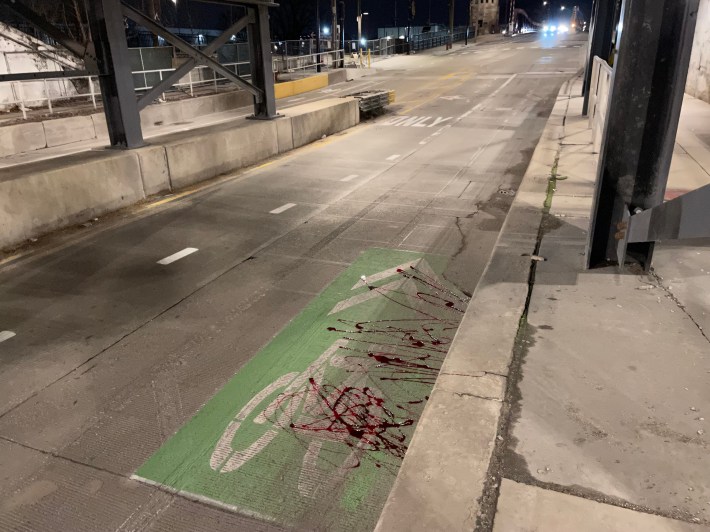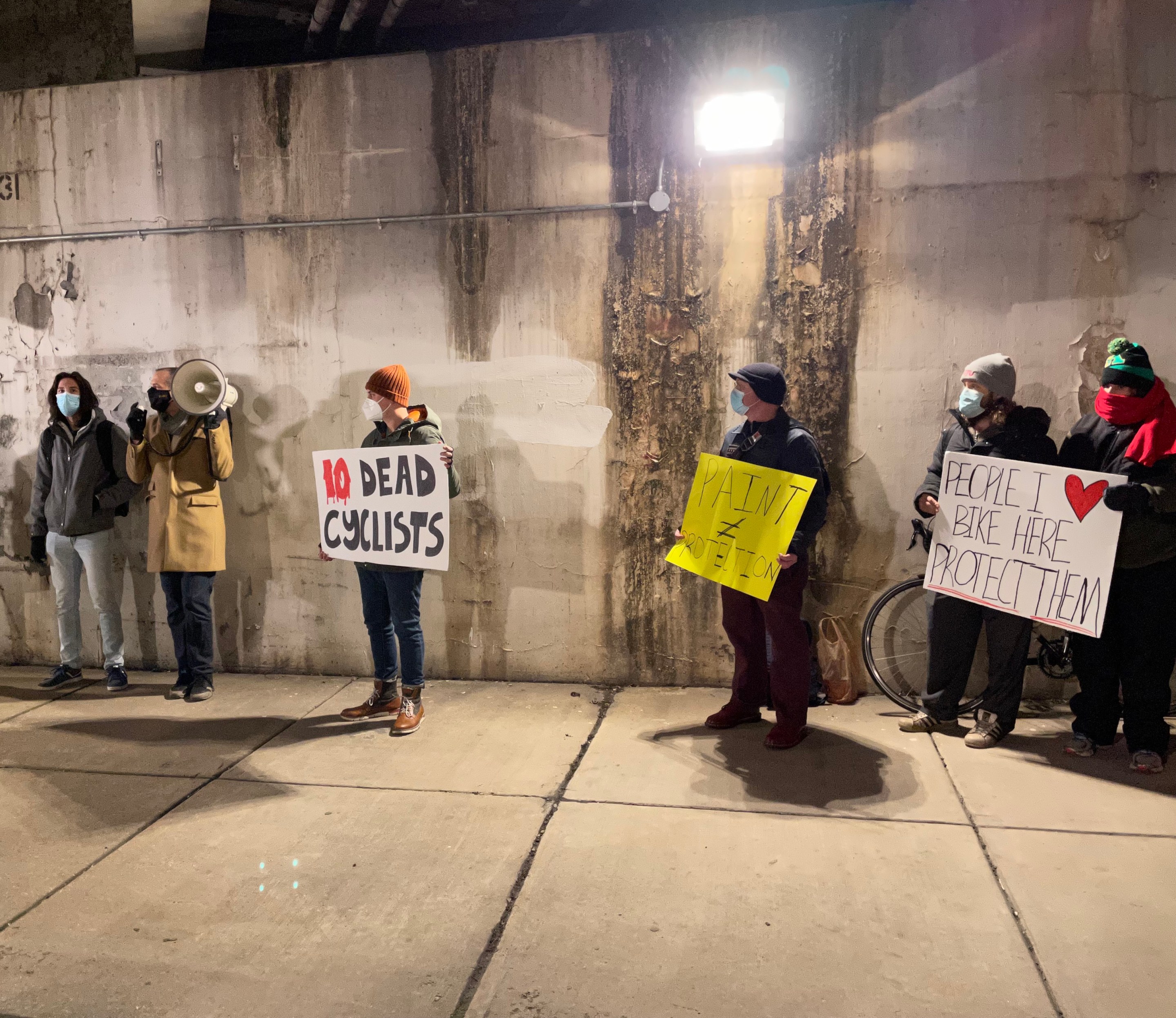A few dozen cycling and environmental justice advocates showed up Wednesday night to protest the removal of part of one of the Halsted Street bike lanes to make room for a turn lane for a new Amazon warehouse in Bridgeport.
Last year community groups and civic organizations unsuccessfully lobbied the city of Chicago to reject a zoning change to allow for a 112,000-square-foot facility on the south bank of the South Branch of Chicago River west of Halsted and north of Archer Avenue. They argued that the Southwest Side already had many fulfillment centers and other industrial sites that contribute to air pollution in the area and create dangerous conditions for walking and biking, and called for a moratorium on logistics facilities on the South, Southwest, and West sides.
Earlier this month, the Chicago Department of Transportation scraped out the northbound Halsted bike lane in the Orange Line and Metra viaduct, just south of the river, to make room for a northbound left-turn lane at a new stoplight to facilitate left turns by truckers heading west into the Amazon facility and minimize delays for other motorists. Since through traffic now merges right into the curb lane to get around the left turn bay, this increases the risk of bike riders being struck from behind.
Last night's protest against this safety downgrade was organized by the 11th Ward IPO, Bridgeport Alliance, and Better Streets Chicago (of which I’m a co-founder). At the height of the rally, 45 people were present.
@amazon warehouse moved in and a bike lane disappeared. @BridgeportAlly and @chi_streets are fighting back. No more ghost bikes, @ChicagoDOT. Bring back the bike lane at Archer and Halsted and make our streets safe. pic.twitter.com/0XD99u30Ue
— John Delurey (@JohnDelurey) December 30, 2021
Chris Kanich of the Bridgeport Alliance was the first speaker at the rally, asking the crowd, “How many more bike lanes should be removed in this city? How many more warehouses do we need on the South and West sides? How many more ghost bikes should we have to put up in this neighborhood?” to which the crowd responded, “No more!”
Next we heard from Matthew Maule, a resident of the area who first raised awareness of the issue by posting photos of the scraped-out bike lane on Twitter. He expressed disappointment about the downgrade. He argued that while other cities have been moving forward with their bike infrastructure, Chicago is “moving backwards.” He said he feels it’s a matter of “when” someone will be injured due to the downgrade, not “if.”
I addressed the crowd next. I pointed out that this downgrade was one of many examples of the city valuing the convenience of drivers over the safety and lives of people biking. I shared that I was encouraged by the crowd that showed up and that Better Streets Chicago was founded on a desire to organize everyday Chicagoans for safer streets,
Ellen Grimes from the Bridgeport Alliance noted that the community group was allied in the fight against the warehouse with several environmental justice organizations such as Little Village Environmental Justice Organization, Equiticity, and Neighbors for Environmental Justice, among others. Grimes stated that thousands of trucks were expected to service the warehouse on a daily basis, putting the lives of local residents at risk in terms of traffic safety and air quality.
Grimes said she reached out about the issue to local alderman Patrick D. Thompson (11th) who told her he was unaware the bike lane would be removed. She contacted the Chicago Plan Commission, which referred her to CDOT, which she said has been unresponsive. The transportation department also failed to respond to Streetsblog's request for info on the decision-making process behind the bike lane removal.
CDOT will sometimes conduct years of public engagement around a single bikeway installation. For example, the community input process for the Dickens Avenue Greenway project in Lincoln Park began more than 2.5 years ago, and the facility still hasn't been installed. But frustratingly there was zero opportunity for community input on the removal of the Halsted bike lane segment.
After removing the bike lane segment, CDOT marked green boxes with "sharrow" bike-and-chevron symbols. But the department has to know that sharrows offer zero safety benefits, especially when it comes to the drivers of large semi trucks and delivery vans who will regularly use this section of Halsted. Since there seems to be no political will to create what's really needed here, a barrier-protected bike lane, at the bare minimum CDOT should install signs warning people on bikes they're entering a dangerous bottleneck.
The last speaker at the rally was Illinois state rep candidate Kina Collins who spoke on the issue of environmental justice and workers' rights. She sees the approval of the warehouse and the proliferation of warehouses on the South, Southwest, and West sides as an environmental justice issue. She supports the efforts of Amazon workers to unionize. Most recently Amazon workers in Cicero staged a walkout to demand safer working conditions and higher wages
As the rally drew to a close, sustainable transportation advocate Kyle Lucas (also a co-founder of Better Streets Chicago) announced that the group had brought some fake blood made of corn syrup, and asked for help pouring it on the street.

Streetsblog photo contributor Eric Allix Rogers later posted photos of a semi driver avoiding the area where we poured corn syrup.
As if to underscore the problem, a truck passed through. A warehouse with heavy truck traffic ought never to have been permitted at this site. pic.twitter.com/VWvOV6Qo80
— Eric Allix Rogers (@EricAllixRogers) December 30, 2021
Kyle and I later spoke with a local neighbor named Dennis who came upon the rally as it was winding down. Dennis regularly bikes on Halsted to travel in the area and around the city. He said the stretch already felt dangerous to him and that the downgrade made cycling conditions worse. He asked if we would hold another rally. If residents want another opportunity to raise their voices to protest safety downgrades and advocate for improvements, there should be no problem getting a good turnout for another rally.





